Peter MALONE
Saturday, 18 September 2021 19:52
Lost Valentine, The
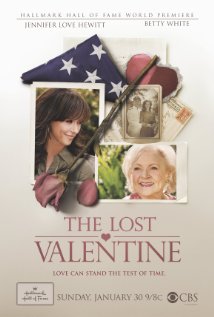
THE LOST VALENTINE
US, 2012, 100 minutes, Colour.
Jennifer Love Hewitt, Betty White, Sean Faris, Billy Magnusson, Meghann Fahey.
Directed by Darnell Martin.
The Lost Valentine is an entertaining Hallmark Hall Fame film for television, aimed at an older audience but with a broader appeal.
In the present, an old lady goes to a railway station every Valentine’s Day, talks to the black attendant, waits and thinks back to her experience of 1944. In 1944, she farewelled her husband on his way to the war. He did not return. Because he was listed missing in action, his wife still waits for some news.
Betty White portrays the elderly widow, illustrating how well Betty White was as a performer, in comedy, television shows, serious films like this.
Sean Faris portrays her nephew, who takes her story to a television network where Susan, Jennifer Love Hewitt, works but is dissatisfied with her programs. She is not attracted by this story but is told to do it by her boss.
She goes to visit the old lady and forms a bond with her, persuading her to do the program, which she does successfully, although the network decides not to put it to air.
Susan tries to do her best for the old lady, contacting a senator, getting information about the husband’s war action and tracks down his place of death in the Philippines and discovers his grave. At the end of the film, the body is brought back with full ceremonies – at the railway station. She has been supported by Lucas – who has an on and off relationship with Susan, finally with her. The happy ending.
1. The title? The reference to the Valentine? The tone? For emotions, tears?
2. The Hallmark Hall of Fame and its reputation for popular stories, emotional stories? The broad appeal?
3. The age target, older audiences, middle age?
4. Betty White, her long career, range of performances, the screen presence, making the role of Caroline credible?
5. Six decades after World War II? On Valentine’s Day, Caroline going to sit at the railway station, waiting? Her talk with the black attendant, their friendship over the years?
6. The memory of Valentine’s Day in 1944, Caroline, her being pregnant, the farewell to Neil? The memento?
7. Lucas, love for Caroline, interest in her story, the possibilities of television program, his visiting the studio, Susan and her disdain of such stories, her having to apologise?
8. The introduction to Susan, at work on television, American Diary? Reactions to the types of stories and investigation? Her friend, the discussions? The boss and his threats? Her embarrassment with Lucas? Told to do the job?
9. The visit, the discussions with Lucas, the visit to Caroline? The phone calls? The discussions? Caroline wondering whether she should agree or not?
10. The setup, the television program, the story, the voice-over? The audience seeing the flashbacks?
11. Childhood, Caroline and Neil, meeting, love, work together, the marriage, the home and his building? The war? His decision to go, patriotism? At the train, the Valentine’s Day? Caroline and the birth of the child, her family? The dreaded telegram? That Neil was missing?
12. The film of the program, Caroline in the garden, talking to camera, her natural abilities? Lucas and his watching? Caroline and the heart turn, the threat to the program? Her strength and courage?
13. Lucas, the physio, helping people, the book, the launch and Susan going?
14. Susan’s fiance, journalist, travel, living together, the possibilities of the proposal, the delay? His return, in Fiji, the embrace, but Susan breaking off the engagement?
15. The completion of the programme – but the station deciding it would not go to air?
16. Susan, concerned for Caroline, trying to do something about Neil’s war history, finding the grave? Her contact with the senator, the documents, the references, information about the Philippines, Manila, the Skype conversations?
17. The flashbacks to Neil’s activity, working with the Filipinos, the dangers, the Japanese, the bombardments, his being wounded, dying, his grave? The Filipinos of the present, the images of the grave, the news, Susan explaining to Caroline?
18. The return of the body, full honours, at the railway station, Caroline waiting, the black attendant and his support? Ceremony?
19. Lucas, relationship with Susan, on and off, her going to him, the happy ending?
Published in Movie Reviews
Published in
Movie Reviews
Tagged under
Saturday, 18 September 2021 19:52
El Lobo
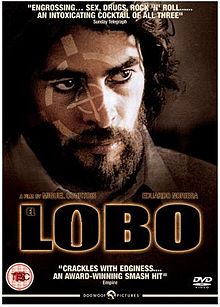
EL LOBO
Spain, 2004, 125 minutes, Colour.
Eduardo Noriega.
Directed by Michel Curtois
Spanish cinema is still coming to terms with the Franco era, with dramas about the Civil War and its consequences and, more recently, films about the final years of Franco’s regime. The recent Salvador is a story of young rebels, terrorist action in the early 1970s and Salvador Puig as the last person to be executed in 1974. The action in El Lobo takes place at the same time. However, the focus is on ETA and the Spanish government’s campaign against the ETA cells in the year’s before Franco’s death.
It is based on actual events.
The Lobo, the Wolf, of the title is a young construction worker from the Basque territories who had friends in ETA but was dismayed when they executed a taxi-driver acquaintance for alleged supplying of information to the Spanish authorities. When he is taken in by the police, the authorities offer him a chance to follow his principles and gain some finance for his straitened family by becoming an informer, then persuading him to infiltrate ETA at its highest level. This he did, keeping his cover through great personal difficulties, and handing over 150 members of ETA to the authorities. Of course, he is eventually discarded and abandoned by the authorities. A post-script tells us that thirty years later, he is still on an ETA hit list.
The film moves well and keeps audiences involved. And Eduardo Noriega is an impressive and engaging screen presence as The Wolf. In fact, the whole cast, both ETA and the Spanish police and secret service, are all convincing. While it is really an espionage drama, it has an almost documentary-like feel about it.
What we are to think and feel is quite ambiguous. It would be interesting to hear how Spanish audiences found it (it was nominated for a number of awards). It would be even more interesting to hear how patriotic Basques found it. The Wolf claims he is a man of principle against the violence perpetrated by ETA, but he is a double agent. The Spanish authorities are ultimately devious and brutal. The ETA terrorists are extremists and unscrupulously violent.
1. A film about Spain, the 1970s, the end of the Franco era, the status of ETA, police work, infiltration, double agents?
2. Audience familiarity with this Spain, with the social issues, the dictatorship of Franco and its effect, the Basque rebellion, the establishing of ETA, its subversive activities against the Spanish government? Its own internal divisions?
3. The credibility of the plot, the central character based on an actual person and his activities?
4. The Spanish settings, sense of location, the Spanish countryside, the towns and villages, extension into France? The musical score and atmosphere?
5. The film establishing the situation in the mid-1970s, Franco and his dying, his heritage, rebellion against him, Conservative forces in Spain? The situation in the Basque territories, police and army and the attacks on the organisation?
6. The opening, murders, the police investigations? Txema, his being a worker, not particularly well educated, his wife and home life? His being associated
with terrorist groups? Susceptible to the invitation by the police and government?
7. The police, interrogating Txema, the idea that he would be good undercover agent? The pressure on him, persuasion and his lack of interest, his financial situation, perhaps engineered by the police themselves, his reasons for saying yes? The effect on his wife, his absences, her growing suspicions, thinking him a traitor?
8. His being accepted by ETA, the questioning, his ability to blend in, handing on information?
9. The organisation, the various leaders, their roles in propaganda, on violent action, killings? How well delineated the various characters, audience response to each of them, the hierarchy, the orders, carrying them out, personal difficulties, tensions?
10. Txema and his ability to blend in, the relationship with Amaia, the sexual relationship, with his wife in the background?
11. The film’s attention to detail of the various missions, Txema and his contributions, his abilities, his following orders?
12. The struggles within the organisation, rivalries, dissension? The effect of this on Txema?
13. The police contacts, ideologies, controlling Txema, using him, prepared to abandon him?
14. The film working as a thriller, almost documentary-like? Insight into the experiences of Spain at the time?
Published in Movie Reviews
Published in
Movie Reviews
Tagged under
Saturday, 18 September 2021 19:52
Falcon Takes Over, The
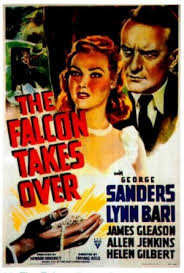
THE FALCON TAKES OVER
US, 1942, 65 minutes, Black and white.
George Sanders, Lyn Bari, Allwn Jenkins, James Gleason, Anne Revere, Ward Bond, Turhan Bey, Hans Conreid.
Directed by Irving Reis.
This was to be the last Falcon film for George Sanders. The role would be taken over by his brother, Tom Conway.
On the surface, this film seems much the same as any other Falcon film, the very suave George Sanders as the playboy and lightly philandering Gay Laurence, known as The Falcon, solving crimes that the police seem to be unable to solve. He has his sidekick, sometimes dumb, sometimes humorous, Goldie Locke, Allen Jenkins. The slow police are represented by James Gleason – and there are plenty of criminals.
However, while the characters are those of Michael Arlen, creator of The Falcon, there is a credit to Raymond Chandler and the plot of his celebrated novel, Farewell, My Lovely. There were to be two later film versions of this novel, in 1944, with Dick Powell as Philip Marlowe, Murder, My Sweet, and the 1975 version with the same title as the novel, with Robert Mitchum as Philip Marlowe.
This film has the same basic plot and keeps a number of the key names, including the famous Moose Molloy, here played by Ward Bond, the mysterious Velma, played by Helen Gilbert, the alcoholic Jesse Florian, played by Anne Revere, the fortune teller played by Turhan Bey, Marriot played by Hans Conreid, and Burnette, here the owner of a nightclub.
Moose Molloy, with the Ward bond filmed to make him look larger, has escaped from prison and is searching for his Velma. This leads to a number of killings, a nightclub manager, an alcoholic woman who is afraid of him, to fortune tellers, a playboy who is part of the plot. Lyn Bari portrays a newspaper reporter, a feisty character, who is in on the investigation and ultimately saves The Falcon’s life. Moose threatens Goldie, The police ask Goldie to give information to them about The Falcon’s movements. The Falcon is attracted by a wealthy woman, whose jewellery has been stolen, who turns out to be Velma and is not above killing The Falcon.
The film is enjoyable in its own right – and comparisons with later films are critically interesting but are not actually very relevant to this film in its own right.
The film was directed by Irving Reis who directed three of the Falcon films.
Published in Movie Reviews
Published in
Movie Reviews
Tagged under
Saturday, 18 September 2021 19:52
You Instead

YOU INSTEAD/TONIGHT YOU'RE MINE
UK, 2011, 80 minutes, Colour.
Luke Treadaway, Natalia Teno.
Directed by David Mackenzie.
While not suggesting anyone should not see You Instead, I would make a caution: anyone over thirty should give a second thought. Anyone over this, a caution, unless you have happy memories of going to music festivals (especially if it rained and offered plenty of mud) or are a die-hard rock and roll fan.
This is what You Instead is about – an immersion in a Scots music festival, T in the Garden, in Kinross Shire. It was filmed there over five days. The plot concerns two days. And, even though the film runs only 80 minutes, it seems longer.
Adam and his partner, Tyko (Matthew Baynton), have arrived at the festival to sing You Instead. Morello is there with her girl group. They bicker a little and, when they are urged to pray in a group by an event officer, he handcuffs them. They spend most of the rest of the film handcuffed. This is no Defiant Ones!
Adam (Luke Treadaway, who composed You Instead) is somewhat taciturn, skinny and not always as interesting as all that. Morello (Natalia Teno), on the other hand, is far more vivacious. They quarrel, they taunt each other, they tangle. Their respective girlfriend and boyfriend make rash judgments and go off on their own. You could probably write the rest of the screenplay yourself, handing over to the cast opportunities for improvisation, which they take, not always persuasively.
It’s all a bit surface characterisation, a fair amount of superficiality and promiscuity (from their girlfriend, boyfriend, the singing partner and the manager). Of course, it has a feelgood ending when Adam gets the crowd (who yell, jump, pump the air and sing as they always do at festivals, all in individual conformism) to call for Morello to join him on stage. And, that’s it.
Published in Movie Reviews
Published in
Movie Reviews
Tagged under
Saturday, 18 September 2021 19:52
Black Death/ 2009
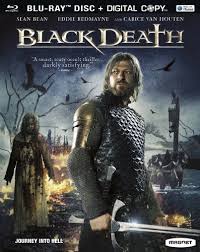
BLACK DEATH
UK/Germany, 2010, 102 minutes, Colour.
Sean Bean, Eddie Redmayne, John Lynch, Tim Mc Inerney, Kimberley Nixon, Andy Nyman, David Warner, Carice Van Houten.
Directed by Christopher Smith.
Black Death is set in England in 1348, at the time of the Black Death plague throughout Europe. It is a sombre film, re-creating the period, in the countryside, in villages hearing infection, in forests, in abbeys.
The film opens in an Abbey with David Warner as the Abbott. Eddie Redmayne is the young monk Osmund, a novice who has a friend, Averill, and he wants to save her and for her to leave the town. A group of mercenaries led by Ulrich, Sean Bean, arrives with a mission to seek out a necromancer in another village. It emerges that his mission is to seek out the witch controlling the village, Langiva (Carice van Houten).
Osmund volunteers to guide the group but finds Averill’s blood-stained clothes. In the village, Lingava urges him to go to a building where he finds Averill, and thinking she is bewitched, kills her.
The witch orders Ulrich to be killed – and he announces that he has the plague. Osmund goes back to his Abbey and the final information is that he became a witch-hunter.
The film has been directed by Christopher Smith, director of three films with the touch of horror: Creep, Severance, Triangle.
1. Audience interest history? Dramatically? Melodrama? Violence and blood?
2. 1348, England, towns and villages, the abbeys, the countryside, the forests? Authentic feel? The musical score?
3. The 14th century, the state of the church, the Popes in Avignon and away from Rome, the plague and the Black Death? The abbeys and the role of the monks? Centres of civilisation – coping with the plague, infections, the mobs?
4. Osmund, his age, novice, the atmosphere of plague and war, the piles of corpses? His friendship with Averill, concerned for her safety, sending her to the forest, the meetings?
5. Ulrich, his arrival in the village, his mercenaries? Commanding? News of the plague, his mission from the Bishops? Osmund and is offering to lead?
6. Ulrich as a warrior, his mission, the ecclesiastical backing, his interchanges with the Abbott, Osmund being allowed to go? The mercenaries, the torture weapon, in action, the truth about the search for the necromancer?
7. The forest, Osmund finding Avril’s clothes, stained with blood? The fight and the bandit ambush? Arriving in the village, suspicions and hostilities?
8. Lingava, the claims and Ulrich denouncing her as a witch? Lingiva and Osmund, his finding Averill’s body, his escape?
9. Ulrich and the mercenaries all drugged, in the prison of the pool, Osmund also? Hob and his being second in charge in the village? Osmund and the killing of Averill? His thinking her bewitched?
10. Lingava, her ordering Ulrich to be killed, his announcement that he had the plague?
11. The final discussions about God and faith?
12. Lingava telling Osmund that Averill was drugged, not dead? The effect on Osmund? Return to the Abbey, and the information that he became a ruthless witch hunter?
Published in Movie Reviews
Published in
Movie Reviews
Tagged under
Saturday, 18 September 2021 19:52
Clash of the Titans/ 2010
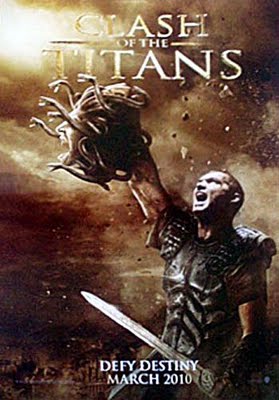
CLASH OF THE TITANS
UK, 2010, 106 minutes, Colour.
Sam Worthington, Gemma Arterton, Mads Mikkelsen, Alexa Davalos, Liam Neeson, Ralph Fiennes, Pete Postlethwaite Jason Flemyng, Evans, Liam Cunningham, Nicholas Hoult, Polly Walker, Luke Treadaway, Elizabeth Mc Govern, Alexander Siddig, Temar Hassan, Danny Huston, Jamie Sives, Kayao Scodolari.
Directed by Louis Letterier.
Well, there's no doubt you get you money's worth of action and special effects. And for audiences who declare that they 'love a good stoush', there are lots of them. After all, Perseus is the son of Zeus, part human, part god, who vanquishes Hades and his plots, Medusa and the monstrous Kraken.
Thirty years ago or so, there was what seemed a rather highbrow cast for this kind of thing: Laurence Olivier as Zeus, Maggie Smith as Thetis (and Ursula Andress as Aphrodite) and written by scholar and dramatist, Beverly Cross. The creatures were a culmination of wondrous cinema creations by expert, Ray Harryhausen, and his Dynamation. He would probably enjoy all the effects here. And the cast includes some highbrow British actors this time. Liam Neeson is Zeus and Ralph Fiennes enjoys himself thoroughly and articulately (and with superb black and fiery effects) as Hades. This makes for some rhetorical confrontations between the two brothers and with Perseus. Perseus is played by Australian Sam Worthington (sounding as if he had been whisper-dubbed by Jason Statham and wanted to make sure that nobody would think he would do a posh pommy accent). Worthington made a great hit in 2009 with his leads in Avatar and stealing the show from Christian Bale in Terminator:Salvation. (Probably many a review will make some comparisons with Russell Crowe and Gladiator.)
Director Louis Letterier is best known for action, action, action (Unleashed, Incredible Hulk). He rarely lets up here. He is not known for dramatic encounters and one suspects that some of these (for example the sequences on Olympus, where Danny Huston as Poseidon gets one line) might appear as extras on the DVD edition.
Whatever, the decisions about editing, it is a rattling good show. Perseus grows up with his adoptive fisherman father (Pete Postlethwaite) who assures him he has a destiny. Demigod Io (Gemma Arteton), his protector, reveals that his mission is to save humans (who, in Argos, had decided they did not need the gods any more) from the vengeance of Zeus and Hades (Poseidon not getting a look in). With a cast of thousands in Argos, just like the epics of yesteryear, the film then concentrates on Perseus' mission and the battles. He is accompanied by warrior draco (Danish actor Mads Mikkelson, Casino Royale villain), Solon (Liam Cunningham) as well as some battle-scarred and defeated giant scorpions, with some deathly once-human creatures, with the kind who ordered his mother's and his death, a deformed Jason Flemyng, with Medusa and, finally, riding Pegasus on the bigger, better and beastlier Kraken. Meanwhile, a false prophet bays for the sacrifice of Andromeda, daughter of the king of Argos, who is strung up (feeling some Andromeda strain) to be devoured by the Kraken.
One is tempted to say that this is a crackin' good show, but, no, we are dealing with the deities and myths of Ancient Greece – which will probably receive a new surge of interest because of this entertainingly exciting action show.
1. The 1981 version, the present version and comparisons? Plot, myths, treatment of the plots? Characters, action, special effects?
2. The re-creation of ancient Greece, land, mountains, sea, villages? Olympus? Action, effects, the Kraken? The musical score?
3. The tone, the blend of matinee action with a serious cast? The touch of the solemn?
4. The title, expectations, battles?
5. Acrisius,, the humans against Zeus, Zeus impersonating the King, the wife pregnant, the child, the effect on the King? The casket into the sea? The rescue of a Perseus, taken to land, raised by the fisherman and the people in the village?
6. Argos, the battles with Poseidon? Hades and his destroying Perseus’s family? The sacrifice of Andromeda to the Kraken? The threat to Argos? Perseus as a demi-God, the King commissioning him to destroy the Kraken?
7. The role of Io, eternal, protecting Perseus?
8. Acrisius, his survival, turning into Calibos, the attack on Perseus and the soldiers, their trek across Greece? The Oracle, the Stygian witches, Perseus fate? The Oracle and the heading Medusa? His achievement with this, the return to articles, the Kraken turning to stone?
9. Hades and his attempt to overthrow Zeus? Unable to? Sentenced to go into the underworld? Perseus saving Andromeda? Zeus restoring Io to Perseus?
10. Fantasy, heroes, the range of gods and their appearance impressions? Perseus the warrior?
Published in Movie Reviews
Published in
Movie Reviews
Tagged under
Saturday, 18 September 2021 19:52
Barretts of Wimpole Street/ The/ 1957

THE BARRETTS OF WIMPOLE STREET
UK, 1957, 105 minutes, Colour.
Jennifer Jones, Bill Travers, John Gielgud, Virginia Mc Kenna, Susan Stephen, Jean Anderson, Leslie Phillips.
Directed by Sidney Franklin.
The Barretts of Wimpole Street is based on a play by Rudolph Besier. It was adapted for the screen in 1934 and directed by Sidney Franklin. It had a very strong cast, Norma Shearer as Elizabeth Barrett, Fredric March as Robert Browning and, especially, Charles Laughton as Mr Barrett. Maureen O’Sullivan? was in the supporting cast.
Norma Shearer was nominated for an Oscar for this role (she had won an Oscar for The Divorcee in 1930). Fredric March had also won an Oscar for Dr Jekyll and Mr Hyde in 1932 and had appeared in such films as The Sign of the Cross. Charles Laughton had won an Oscar for The Private Life of Henry VIII and was soon to appear in Mutiny on the Bounty.
The film was criticised as being rather staid even though it looked lavish in its presentation of 19th century London.
Franklin had the opportunity to direct a widescreen colour version, using the screenplay from 1934. This time it was a British production with Jennifer Jones as Elizabeth Barrett and Bill Travers as Robert Browning (with his wife Virginia Mc Kenna as Henrietta). This time Mr Barrett is played with some subtlety by John Gielgud.
The second film is much more romantic than the first, with an English sensibility, especially in the cast, bringing to life the romance between the two poets under the eye of the disapproving father.
1. The impact of this story of a literary family and famous poets? Audience knowledge of Elizabeth Barrett and Robert Browning?
2. The re-creation of the Victorian period: costumes, décor, photography, musical score?
3. The literary style of the screenplay? Based on a play and opened out? How successfully – each version based on the same play and made by the same director with twenty years in between, the 30s film-making and the 50s?
4. The film as a romance, a tragedy? The place of women? Relationships within families – especially the psychology of a tyrannical and possessive father and the effect on his daughters?
5. What were the main characteristics of the Victorian atmosphere, the picture of family life, the relationship of brothers and sisters, the influence of the father, the norms for manners and behaviour, the clashes of will, the influences of power, the potential for suffering the need for rebellion? How stifling was the atmosphere? How well was this communicated?
6. How did the film successfully make Elizabeth central? Her relationship with her father, his dominance of her, the sequence on the drinking of port, Elizabeth as joyful central to her family, her relationship with Wilson, as ill, as pampered? Elizabeth as the poetess and her recitals of her poetry? The focus on the relationship between Elizabeth and Browning? by letter, in reality? The film having her reviving through her relationship with Browning? The change from fear to courage? The quality of her happiness and recovery? Her defiance? The power of love? The supporting of the brothers an and sisters? The goal of personal happiness? Was Elizabeth Barrett a convincing character and person of this film?
7. How important for the film and the impact was Mr Barrett? How did he embody the harsh aspects of the 19th century? His instilling of fear, pampering Elizabeth, making her better than she was, knowing all, his sour attitude to life, his harshness, his ruling his family, his blackmailing them emotionally, the length that he would go to keep his power? The effect of defiance on him? The importance of his revelation to Elizabeth about his hatred of marriage and love? (the contrast of emotion with his niece and the intensity of the kissing of his niece)? The effects of her decisions on him? His influencing Elizabeth to defy him? How sane was he? How moral?
8. The importance of Henrietta and the others, contrasting with Elizabeth? Lively people with squashed emotions, growing in love, needing support, yet fearful? The administering of the oath and Henrietta’s breaking it? The hatred for her father?
9. The portrait of 19th century servants, Wilson as a servant, faithful etc?
10. Comment on the way the film filled in the background of the family and the atmosphere, the cousins and the marriages, the doctors and their visits, walks and rides in the park?
11. What impact did Browning have in the film? As a forceful person like Barrett? Yet his humanity? A convincing poet? A man of forcefulness and charm? The good effects of his influence on Elizabeth?
12. How well did the film present insight into the family, love and hatred in family, power and domination, the destructiveness of selfishness?
13. What audience response to these themes did the film evoke? The emotional response of the audience in the area of freedom and obedience?
14. How enjoyable a film was this? How good a historical film? How important a thematic film of human life?
Published in Movie Reviews
Published in
Movie Reviews
Tagged under
Saturday, 18 September 2021 19:52
Apostle, The
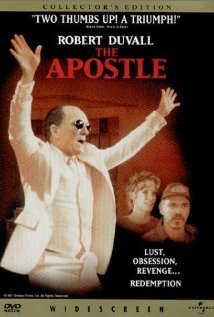
THE APOSTLE
US, 1997, 134 minutes, Colour.
Robert Duvall, Miranda Richardson, Farrah Fawcett, Billy Bob Thornton.
Directed by Robert Duvall.
Euliss Dewey, known as 'Sonny', is a travelling evangelist with a popular clientele in the American south. He grew up attending black church services and has absorbed their spirit. He is a persuasive preacher and, no matter what his sins, he is a true believer.
However, he has been voted out of his church of which he was a co-founder. His wife, Jessie, is involved with another minister. Sonny arrives at a baseball game and attacks the younger man then fears that he has killed him.
He leaves town, and ditches his car in a lake. He then prays that God will call him to be an apostle. He rebaptises himself. He calls himself 'The Apostle E.F.' and moves to Louisiana to begin his ministry.
To support himself, he works as a short-order cook and has a radio program for preaching. His centre is the One Way Road to Heaven Holiness. The police are searching for him when Jessie hears him on the radio. In the meantime he has confessed to a fellow-preacher (and is overheard by his partner, Sam).
When the police do arrive, he is preaching powerfully but, at the end, he gives himself up to them.
Robert Duvall once attended a revival meeting and was fascinated. He also felt that many of the subsequent preachers whose meetings he attended had not been fairly treated, especially by the media. So, he wrote the screenplay for The Apostle and directed it and gained an Oscar nomination for his performance.
It is not so much a critique of revivalist religion and of the credulity of so many who attend the meetings with their enthusiasm, their singing and dancing, the prayer and tongues and their belief in healings. However, Duvall is sympathetic in his portrait of Sonny, a man who has a gift for preaching, loves prayer and loves his ministry. And the screenplay is in no way condescending to the range of people, generally poor and without benefit of much formal education, for whom this kind of religion is a joy and a comfort.
Though Sonny is obviously a Christ-figure in his capacity to pray and uplift, he is a mixture of goodness and sin. This sinfulness is not underplayed and Duvall makes Sonny a complex figure, amazingly honest in his goals and in his performance and as sincere in his acknowledging of his violence and guilt.
There are some fine supporting performances from Farrah Fawcett as his estranged wife and Miranda Richardson as the radio station secretary he befriends. An important aspect of the plot plays beneath the final credits.
1. The impact of the film? Evangelical Christianity? The portrait of this Christianity, how critical, how sympathetic? Themes of belief, salvation, prayer, redemption?
2. The opening in Texas, 1939, the revivalist meeting, the apostle and his presence, his nanny, his family, his preaching sessions when he grew older? The background for the character of The Apostle? The Hispanic congregation, the woman translating and moving just like the preacher?
3. The present, Texas, homes, towns, the various churches, revivalist centres? Transition to Louisiana?
4. The musical score, the range of hymns, well-known, not so well known? The contribution to the atmosphere? The Apostle and his singing?
5. Audience response to Evangelical Christianity, beliefs, sympathies, the style of prayer, tongues, dancing? The black communities? The poor communities? Revival and faith healings?
6. Sonny, his age, experience, personality? His explicit language of faith and Jesus as personal saviour? His convictions? The car crash, going to the man at the wheel, his words of comfort, his words of faith, the response of the man? The police looking on?
7. Sonny and his ministry, the church? His travelling? Jessie, her relationship with her husband, the children? Horace and Sonny’s trust in him? The adultery? Sonny coming to the house, throwing the can? The baseball game? The children? Horace present, Sonny getting the bat and hitting him? Rough with the children? Realising what he had done, fearing that Horace was dead? His leaving? The visuals of him at the crossroads, his prayer? Sinking the car in the lake? Tearing his book of addresses, singing on the bridge?
8. Sonny and his personal prayer, mad at the Lord, his relationship with his mother, travelling with her? Her singing, her religious background? The disputed the church, Jessie wanting the church, the meeting with the council, the vote ousting him? His leaving? The visuals and Jesse, her playing the piano, running the church, the congregation? His mother’s death?
9. His view of Satan putting a wedge between his family? Explaining that he called his children “beauties”? Encountering the fisherman, kindly man, his story? Sonny living in the tent?
10. Jessie, the voice-over on adultery?
11. Sonny and his travels, on the bus, seeing the blessing of the fleet and his openness to all religions? His fixing the car and his abilities as a mechanic?
12. Searching out and meeting the old pastor, wanting a new church, C. Charles Blackwell, the discussions, asking why Blackwell should trust? going to visit the church, Sonny happy, taking over?
13. Sonny and his radio ambitions, calling himself the profit E.F? Meeting Toosie at the radio station? Her interest? The manager, the interview, his not wanting any speaking in tongues? The money issue? Sonny, his verve, his radio broadcasts like a revivalist meeting?
14. Meeting Sam, working on the cars, Sam and his friendship, believing in Sonny? Going to the meetings? Growing in faith?
15. Sonny’s wondering about the family, his mother’s collapse, in hospital, not able to ring her because of the police? His friend back home, support? His mother’s death?
16. Toosie, the attraction, inviting her to dinner, prayer of crease before the dinner, sharing with her, her story, ex-husband and the boys, taking her home? Her not being ready for the sexual encounter? Her being part of the congregation?
17. The group fixing up the church, catching the bus, collecting the group of the faithful, taking them to the church?
18. Phoning Jesse, praying for Horace? His being in a coma?
19. The service, Psalm 150? Continuing on the radio, the piano? Delivering the food to the poor? The born-again people, the river immersions?
20. The stranger, coming to the church, questioning Sonny, wanting to know what EF meant? His racism, referring to niggers? Outside, the fight with
Sonny?
21. The picnic, joyful, the stranger arriving with his truck, Sonny putting his Bible in front of the grader, defiance, the response of the stranger, others putting their Bibles down, the conversion experience, confession, weeping? The radio manager and his broadcasting the experience over the radio?
22. Talking over his future with C. Charles Blackwell, Blackwell and his wife, trusting Sonny, participating in the worship after his retirement? Sam, overhearing the conversation about what Sonny had done? Wary? Yet at the final ceremony, the conversion experience, kneeling and weeping?
23. The final service, entrusting the future to the community, to Mrs Blackwell, the police at the back, waiting for him to finish, Sam and his acceptance, the witness?
24. Sonny, owning up to what he had done? The optimism of his working with the road gang and getting them to proclaim the name of Jesus?
25. Robert Duvall’s work, writing and directing, his interpretation of Evangelical Christianity, his strong performance?
Published in Movie Reviews
Published in
Movie Reviews
Tagged under
Saturday, 18 September 2021 19:52
Lost Highway
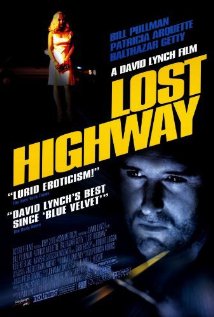
LOST HIGHWAY
US, 1997, 134 minutes, Colour.
Bill Pullman, Patricia Arquette, Balthazar Getty, Robert Blake, Gary Busey, Robert Loggia, Richard Pryor, Jack Nance, Natasha Gregson Wagner, Giovanni Ribisi, Marilyn Manson.
Directed by David Lynch.
If you want a film that makes you think - and still be uncertain who what has actually happened - this is it.
David Lynch seems to revel in the reputation of being weird. His plots explore the dark side of the human psyche. Are his characters two sides of the one person? How do they interact realistically and psychologically? And while one of the characters is Death (who is also two persons), then who is the villain, the Devil? If this sounds interesting, then go to Lost Highway. If not,... Lynch has a distinctive visual, colour as well as aural style, blending music and sounds, familiar from Twin Peaks. His dialogue is a blend of the arresting and the banal, designed to dramatise meaning in banal life.
Bill Pullman and Balthazar Getty play the two (or one) central characters and Patricia Arquette plays one (or two). Robert Blake is Death and Robert Loggia the evil one.
It is all an allegory of people lost on the highway of life.
1. The impact of the film? Puzzle? Confusion? Parallel worlds?
2. The work of David Lynch, visual, oral, another world?
3. The title, the opening and closing credits, the road, the lines, the symbol?
4. The two stories, the moments of change, supernatural touches, cosmic touches? Issues of identity, the character in the two parts, good and bad, interchange of characters? Two faces? Harry and Renée, Peter and Alice? The presence of the stranger in each story? Symbol of Death?
5. Introduction to Harry, listening to the voice, his relationship with Renée, sexual compatibility, the saxophone, playing at the club, loud and lively, the crowds, his phone call to his wife, going home, Renée in bed? The next morning, the packet at the door, the video? The second envelope? Playing the video? Seeing themselves filmed in their bedroom? Calling the police, the police and their characters, manner, the visit, the interrogation, sympathy? Their promises? The video of Renée’s death, the murder, Harry covered in blood? Arrest, going to prison? The visuals of the change of character in the prison?
6. The introduction of Pete Dayton , his story, in himself, age, younger, his family, relationship with his parents, discussions with them, their tentative characters? His work as a mechanic, the supervisor in the form of Richard Pryor? The assistant and the conversations with Peter? Eddie, his arrival, the car, the presence of Alice? Seductive, despite Peter’s relationship with Sheila? The affair, sensuality? Eddie and his threats, the phone calls? Alice and her story, the pornography, her lover? Her plan, the date, hitting the lover on the head – his death, Alice blaming Peter? The driving away, plans for the future? Going to the hut – initially in flames but then normal, Pete, the clash with Sheila, going to Alice? His transformation into Harry? The confrontation with Death? Harry’s confrontation with Eddie, his death? Death shooting Eddie? The escape, driving, Harry's being transformed, the primal scream?
7. The role of Death, at the social, getting Harry to call home and Death answering, the puzzle? Death and Eddie? The threats to Pete?
8. Eddie, sex exploitation, unless participating in stripping, his death?
9. Renée, character, wife? The contrast with Alice seductive? Scheming?
10. The men in the two roles? The women in the two roles? Women as seductive, exploited, men as dominant but victims?
11. This contribution to David Lynch’s world, imagination and style?
Published in Movie Reviews
Published in
Movie Reviews
Tagged under
Saturday, 18 September 2021 19:52
Wetlands
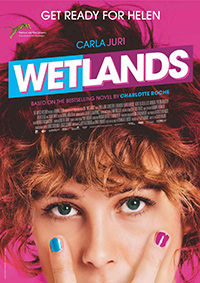
WETLANDS/ FEUCHGEBEITE
Germany, 2013, 105 minutes, Colour.
Carla Juri, Christoph Letkowski, Marlen Kruse.
Directed by David Wnendt.
This is a very confronting film, although many audiences found it amusing and funny.
The central character, Helen, is a complete narcissist, generally unaware of sensitivities towards others, even of her parents, her best friend, the nurse at the hospital. She is also completely obsessive, genitally and anally so. And the plot as well as the visuals illustrate this more than many audiences might want to see and hear.
At the film’s opening, Helen tells us that she is not particularly interested in hygiene, something which is very evident in what follows. With a scene on a dirty toilet seat, we are taken into the world of Helen’s obsessions. All bodily functions, all secretions and excretions make their appearance. Which will be fairly abhorrent to fastidious audiences. It is not a matter of being prudish, although there is quite an amount of nudity and sexual behaviour, but of personal interests and tastes. One of Melbourne’s chief film reviewers referred to the effect of the film as “endearing”. Others will find it repulsive. The reviewer suggested that this would become a cult film but referred to it as a favourite for adolescent audiences.
The film is based on a controversial bestseller,
Helen is a young adult, has been adversely affected by some of her parents’ behaviour, including her mother offering to catch her but letting her fall so that she would learn to trust no-one, even parents. Her mother continues to be an influence, embracing Catholicism at one stage, going to church, but having a number of men in her life. Her father has gone off on his own, is interested in younger women, as we see, but still visits his daughter. It is suggested that she has been somewhat traumatised in her relationship with her parents – which are shown in a number of flashbacks.
She comes across a young woman, becomes very friendly, explains her life to her, suggests that the friend behave somewhat similar fashion – which she does so with an excremental episode with her boyfriend – but actually becomes pregnant and wants to live more normally, much to Helen’s disdain.
Helen explains that she has haemorrhoids. She also injures herself in the anal area requiring hospitalisation and an operation. She clashes with the doctor, with the head nurse, but is friendly with a nurse, Robin, and discusses a lot of sexual matters with him – and - one doesn’t quite know how - he declares ultimately that he is in love with her.
There is more blood in the hospital as Helen injures herself in order to stay there. Which seems to indicate that she has something of a death wish exhibited in extreme manners of self-harm.
There would be different responses from women watching this film, with its female exposure and exposé, women identifying from the inside of the character with the male audience observing, comfortable or uncomfortable at such detail and in such close-up. There are many gross sequences as Helen certainly proves that she has no concern for hygiene, claiming that unhygienic behaviour has never harmed her, and some gross-out sequences such as men masturbating on a pizza.
This is a German film, perhaps with a German sensibility. At quite a full press preview, there was a great deal of laughter, sometimes in embarrassed disgust, but audiences perhaps feeling a sense of liberation as well as they watched and listen to Helen. There was some applause at the end.
Certainly different senses of humour and, more to the point, different tastes.
Published in Movie Reviews
Published in
Movie Reviews
Tagged under